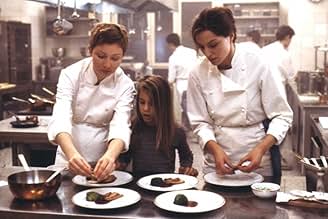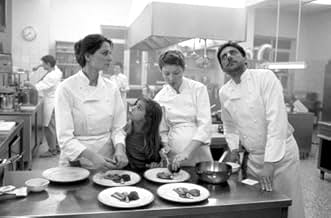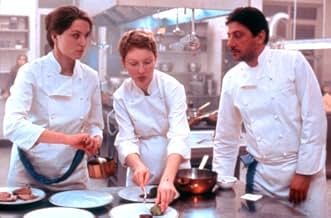AVALIAÇÃO DA IMDb
7,2/10
8,7 mil
SUA AVALIAÇÃO
Adicionar um enredo no seu idiomaWhen a headstrong chef takes charge of her equally stubborn 8-year-old niece, the tensions between them mount... until an Italian sous-chef arrives to lighten the mood.When a headstrong chef takes charge of her equally stubborn 8-year-old niece, the tensions between them mount... until an Italian sous-chef arrives to lighten the mood.When a headstrong chef takes charge of her equally stubborn 8-year-old niece, the tensions between them mount... until an Italian sous-chef arrives to lighten the mood.
- Direção
- Roteirista
- Artistas
- Prêmios
- 14 vitórias e 7 indicações no total
Wolf-Dietrich Sprenger
- Lauter Gast
- (as W.D. Sprenger)
Victoria Trauttmansdorff
- Begleiterin
- (as Victoria von Trautmannsdorf)
Jerome Ducornau
- Jean
- (as Jerome Ducournau)
Avaliações em destaque
A strange thing about the food: some of it, like the bird-cooked-in-pig's-bladder which Martha describes in loving detail in order to have something to talk about while she's with her therapist, sounds good, and perhaps even looks good, without being in the least bit appetising. You'd have to be mad to actually eat anything that's been cooked in a pig's bladder. But Martha is probably right aesthetically, if not in any other way: if she says the best way to cook the bird is in a pig's bladder, then you'd better believe it.
Martha is a superb creation. She's a good chef. (She may be the best chef of any film ever made.) When her boss sends her to a therapist, she talks about food and cooking, which interest her, rather than about herself, which doesn't interest her. She goes to therapy because her boss orders her to, and when her therapist (who's no fool either) asks her why she thinks her boss orders her to, she says, as though considering the question for the first time, that she doesn't know and she clearly doesn't care, either.
When various people (her orphaned niece, an Italian cook) come along to disrupt her life, we're on her side in wanting her to retain control; and although these likable people DO successfully disrupt her life, she does successfully retain control; so everyone wins. And it's hard not to admire someone who can not only insult the philistines who eat at the restaurant where she works but who know how to do so properly. These people don't know how good they have it. I'd rather be insulted by her than flattered by some spineless flunky.
The script, word for word, and moment for moment, is as perfectly judged as one of Martha's dishes. The IMDb user who says of Lina: "She didn't cry when her mother died, but she was really upset when Martha forgot to pick her up. It wasn't her fault, it was the script's" merely shows how much his sensibilities have been coarsened by Hollywood cliché. In fact, the film shows genuine insight into the way people naturally react, not the way lazy screenwriters would like to train them to react. Lina reacts to her mother's death not with the usual screen histrionics but by not eating. Tears are reserved (as they are in life) for less important misfortunes.
This is an assured, intelligent, charming film. Even the use of music shows an unerring touch. I'm eager to see what Sandra Nettelbeck does next.
Martha is a superb creation. She's a good chef. (She may be the best chef of any film ever made.) When her boss sends her to a therapist, she talks about food and cooking, which interest her, rather than about herself, which doesn't interest her. She goes to therapy because her boss orders her to, and when her therapist (who's no fool either) asks her why she thinks her boss orders her to, she says, as though considering the question for the first time, that she doesn't know and she clearly doesn't care, either.
When various people (her orphaned niece, an Italian cook) come along to disrupt her life, we're on her side in wanting her to retain control; and although these likable people DO successfully disrupt her life, she does successfully retain control; so everyone wins. And it's hard not to admire someone who can not only insult the philistines who eat at the restaurant where she works but who know how to do so properly. These people don't know how good they have it. I'd rather be insulted by her than flattered by some spineless flunky.
The script, word for word, and moment for moment, is as perfectly judged as one of Martha's dishes. The IMDb user who says of Lina: "She didn't cry when her mother died, but she was really upset when Martha forgot to pick her up. It wasn't her fault, it was the script's" merely shows how much his sensibilities have been coarsened by Hollywood cliché. In fact, the film shows genuine insight into the way people naturally react, not the way lazy screenwriters would like to train them to react. Lina reacts to her mother's death not with the usual screen histrionics but by not eating. Tears are reserved (as they are in life) for less important misfortunes.
This is an assured, intelligent, charming film. Even the use of music shows an unerring touch. I'm eager to see what Sandra Nettelbeck does next.
This German film is one of the happiest surprises of the year. Not only is it a well paced, acted, and directed, but it involves the viewer like no other film in recent memory. Director/writer Sandra Nettelbeck deserves praise for bringing this joyous piece to the screen.
Martina Gedleck, as Martha, is perfect as the control freak of the upscale restaurant. Obviously, she can cook, judging by the full houses and the good vibes she generates among the diners. What she has in smarts, she lacks in social graces. Obviously, she doesn't have a life.
Her world is shattered by the arrival of a niece that comes to her under tragic circumstances, and from Mario, the new Italian cook. One can see the new man in her kitchen is too much of a free spirit, who ultimately will be her downfall.
Mario, very nicely played by Sergio Castelletto, is the opposite of his German colleague. It doesn't take long for him to charm the daylights out of Martha. Sparks fly whenever they are on screen together. Both principals have the right chemistry and that's why this film works so well. It will surely disarm anyone in the right state of mind. The only thing is that one must leave the theatre craving for a great meal.
Martina Gedleck, as Martha, is perfect as the control freak of the upscale restaurant. Obviously, she can cook, judging by the full houses and the good vibes she generates among the diners. What she has in smarts, she lacks in social graces. Obviously, she doesn't have a life.
Her world is shattered by the arrival of a niece that comes to her under tragic circumstances, and from Mario, the new Italian cook. One can see the new man in her kitchen is too much of a free spirit, who ultimately will be her downfall.
Mario, very nicely played by Sergio Castelletto, is the opposite of his German colleague. It doesn't take long for him to charm the daylights out of Martha. Sparks fly whenever they are on screen together. Both principals have the right chemistry and that's why this film works so well. It will surely disarm anyone in the right state of mind. The only thing is that one must leave the theatre craving for a great meal.
This film is an excellent psychological study of a VERY controlled and emotionally constricted woman who uses food, believe it or not, as a way of avoiding intimacy. She is a superb chef who is incredibly precise and demanding concerning her cooking because she is so uncomfortable with people. However, into her tightly controlled world comes chaos in the form of her niece--whose mother was just killed in an auto accident. Not surprisingly, she has a hard time relating to this child and I was thrilled that her transformation to a whole person took time and wasn't achieved in a Hollywood-style way. Instead, this little girl (who was not overly cute or fake--thank goodness) and a new chef at her restaurant (who was completely unlike her) influence Martha in a way that is believable and satisfying.
By the way, while not quite as good as The Big Night (which came out the same year) or Babette's feast, this movie is VERY reminiscent of them--elevating food to a true work of art.
By the way, while not quite as good as The Big Night (which came out the same year) or Babette's feast, this movie is VERY reminiscent of them--elevating food to a true work of art.
(spoiler regarding the general plot)
Bella Martha reminds me of About A Boy, the "no man is an island" aspect of it. In some ways, Martha is like the guy played by Hugh Grant. The difference though is that while he apparently is really happy about the state of affairs, i.e. the isolation, she is not (even if she may not be fully aware of her own unhappiness). She has to visit a therapist regularly, although she claims that this is purely on instruction of her boss. I call this visit the first of the four "relationships" just to make the number sound more interesting.
The other three relationship all start to develop quite early in the film. First, a neighbour moves in, a gentlemanly engineer called Sam. Then in her "office" i.e. the kitchen of a restaurant where she is the chef, a chap called Mario is brought in by her boss as temporary relief for her assistant on maternity leave. Finally, death of her single-parent sister in an accident left her taking care of her eight-year-old niece Lina while they search her father in Italy.
The first half of the film developed these three relationships along the two fronts: home and office. Soon, it is clear that Sam's role is not really significant, serving just as a dependable friend and emergency-baby-sitter. On the other hand, rocky starts of the other two relationships smooth out as the two fronts merge. Lina comes to the restaurant kitchen in the evenings, becoming a darling there, while Mario becomes a family friend and Lina's buddy, and the three look just like a family. We begin to see smiles on Martha's face.
As in similar movies, just after the mid-point, when characters are well developed and things go nicely, conflicts occur. What I found is that the hostility of Lina towards Martha is less than convincing, even if we take into account her possible rejection of Martha as a mother-substitution. The eventual reconciliation also comes a little too easily. The other conflicts, on which I won't go into details, are not that well developed.
But that is exactly the main point. This is not a Hollywood movie with the standard formula of powerful dramatic conflicts and climatic tear-jerking conclusions. This point is well made when we see the ending of the story given to us quite casually as part of the credit roll. Oh yes, there's a concluding scene with the therapist, reminding us of the sense of humour that comes as part of the film.
Smooth jazz (not sure if that's the right terminology) has been used throughout the film, at the right times, enhancing it rather than distracting from it.
Finally, I really love the scenes in the kitchen which is Martha's entire universe at the beginning of the film, as well as where her reconciliation with both Mario and Lina first takes place. The story aside, I really enjoy the operation in the kitchen, which is the exact opposite to the mass production lines brought about by the industrial revolution. Here, in Martha's kitchen, things are done with what I can only describe as artistic flair.
Bella Martha reminds me of About A Boy, the "no man is an island" aspect of it. In some ways, Martha is like the guy played by Hugh Grant. The difference though is that while he apparently is really happy about the state of affairs, i.e. the isolation, she is not (even if she may not be fully aware of her own unhappiness). She has to visit a therapist regularly, although she claims that this is purely on instruction of her boss. I call this visit the first of the four "relationships" just to make the number sound more interesting.
The other three relationship all start to develop quite early in the film. First, a neighbour moves in, a gentlemanly engineer called Sam. Then in her "office" i.e. the kitchen of a restaurant where she is the chef, a chap called Mario is brought in by her boss as temporary relief for her assistant on maternity leave. Finally, death of her single-parent sister in an accident left her taking care of her eight-year-old niece Lina while they search her father in Italy.
The first half of the film developed these three relationships along the two fronts: home and office. Soon, it is clear that Sam's role is not really significant, serving just as a dependable friend and emergency-baby-sitter. On the other hand, rocky starts of the other two relationships smooth out as the two fronts merge. Lina comes to the restaurant kitchen in the evenings, becoming a darling there, while Mario becomes a family friend and Lina's buddy, and the three look just like a family. We begin to see smiles on Martha's face.
As in similar movies, just after the mid-point, when characters are well developed and things go nicely, conflicts occur. What I found is that the hostility of Lina towards Martha is less than convincing, even if we take into account her possible rejection of Martha as a mother-substitution. The eventual reconciliation also comes a little too easily. The other conflicts, on which I won't go into details, are not that well developed.
But that is exactly the main point. This is not a Hollywood movie with the standard formula of powerful dramatic conflicts and climatic tear-jerking conclusions. This point is well made when we see the ending of the story given to us quite casually as part of the credit roll. Oh yes, there's a concluding scene with the therapist, reminding us of the sense of humour that comes as part of the film.
Smooth jazz (not sure if that's the right terminology) has been used throughout the film, at the right times, enhancing it rather than distracting from it.
Finally, I really love the scenes in the kitchen which is Martha's entire universe at the beginning of the film, as well as where her reconciliation with both Mario and Lina first takes place. The story aside, I really enjoy the operation in the kitchen, which is the exact opposite to the mass production lines brought about by the industrial revolution. Here, in Martha's kitchen, things are done with what I can only describe as artistic flair.
A few rhetorical questions:
a. Why are there no great English-language food/romance movies? Whenever you see a movie that truly ravishes you with food preparation and recipes as part of the atmosphere of the movie, it comes from France or Mexico or Hong Kong - or, if it is in English, it's borrowed culturally from another country (e.g. Chocolat, or the Mexican-American adaptation of Ang Lee's Eat Drink Man Woman). I think it's because the English speaking societies of the world have a relatively unsophisticated approach to food preparation and dining, manifest in our great contributions to world culinary arts - fast food and industrial agriculture, plus cooking technologies that take art out of the equation. You can't have a sexy drama set amidst a world of force-fed veal or microwave dinners.
b. Why do we never talk about German comedy? The Germans do have a comedic tradition, but the movies that are released in the US tend to be solemn dramas, violent or shocking action pieces or grim experimental works. On the rare instances that I see a German comedy, I'm always pleasantly surprised, and I have the feeling I'm missing out.
c. Why are European movies so much better than American films at showing sexiness and desirability in 30- or 40-something year-old women? I have a pet theory, that European sensibilities about marriage and commitment are sufficiently different from American norms that there is the expectation that a 35-year old woman may yet be actively and happily single, or perhaps a single mom who isn't stigmatized to feel that she had best find some sucker to marry her and get out of the dating pool.
d. Why isn't jazz used in American soundtracks anymore? In this film set in Germany, the score is assembled by Manfred Eicher (founder of ECM, the acclaimed modern-jazz label), and it's all good. Some nice German lieder, classic vocal jazz, and instrumental pieces by Keith Jarrett and others. We Americans appear to have forgotten jazz as soundtrack music.
In any case, Mostly Martha is a fine little movie set in contemporary Köln, starring Martina Gedeck as the title character. Martha is a neurotic, workaholic chef at a high-end restaurant, whose control freak tendencies keep her at a distance from everyone. When her boss insists that she go to therapy, she replies by preparing recipes for the hapless shrink. Both lonely and a loner (a tricky combination), she throws herself into her work to the point of exhaustion.
Martha's single-minded life is thrown upside down when she suddenly becomes the guardian to her niece Lina (Maxime Foerste). As she struggles to take on this new role, the arrival of a competitor in the form of a brash Italian chef (Sergio Castellitto) threatens her supremacy in the kitchen.
Any viewer of romantic comedies knows where this is going, but I have no complaints about the plot line. The performances were all good; the dialogue is thoughtful; the food looks delicious. It's not a great movie, but it's a good one and would be an admirable effort by any studio.
a. Why are there no great English-language food/romance movies? Whenever you see a movie that truly ravishes you with food preparation and recipes as part of the atmosphere of the movie, it comes from France or Mexico or Hong Kong - or, if it is in English, it's borrowed culturally from another country (e.g. Chocolat, or the Mexican-American adaptation of Ang Lee's Eat Drink Man Woman). I think it's because the English speaking societies of the world have a relatively unsophisticated approach to food preparation and dining, manifest in our great contributions to world culinary arts - fast food and industrial agriculture, plus cooking technologies that take art out of the equation. You can't have a sexy drama set amidst a world of force-fed veal or microwave dinners.
b. Why do we never talk about German comedy? The Germans do have a comedic tradition, but the movies that are released in the US tend to be solemn dramas, violent or shocking action pieces or grim experimental works. On the rare instances that I see a German comedy, I'm always pleasantly surprised, and I have the feeling I'm missing out.
c. Why are European movies so much better than American films at showing sexiness and desirability in 30- or 40-something year-old women? I have a pet theory, that European sensibilities about marriage and commitment are sufficiently different from American norms that there is the expectation that a 35-year old woman may yet be actively and happily single, or perhaps a single mom who isn't stigmatized to feel that she had best find some sucker to marry her and get out of the dating pool.
d. Why isn't jazz used in American soundtracks anymore? In this film set in Germany, the score is assembled by Manfred Eicher (founder of ECM, the acclaimed modern-jazz label), and it's all good. Some nice German lieder, classic vocal jazz, and instrumental pieces by Keith Jarrett and others. We Americans appear to have forgotten jazz as soundtrack music.
In any case, Mostly Martha is a fine little movie set in contemporary Köln, starring Martina Gedeck as the title character. Martha is a neurotic, workaholic chef at a high-end restaurant, whose control freak tendencies keep her at a distance from everyone. When her boss insists that she go to therapy, she replies by preparing recipes for the hapless shrink. Both lonely and a loner (a tricky combination), she throws herself into her work to the point of exhaustion.
Martha's single-minded life is thrown upside down when she suddenly becomes the guardian to her niece Lina (Maxime Foerste). As she struggles to take on this new role, the arrival of a competitor in the form of a brash Italian chef (Sergio Castellitto) threatens her supremacy in the kitchen.
Any viewer of romantic comedies knows where this is going, but I have no complaints about the plot line. The performances were all good; the dialogue is thoughtful; the food looks delicious. It's not a great movie, but it's a good one and would be an admirable effort by any studio.
Você sabia?
- CuriosidadesSergio Castellitto's German wasn't good enough so Frank Glaubrecht was brought in to dub his voice for the German version.
- Erros de gravaçãoWhen Mario and Lina get ready to cook dinner at Martha's apartment, Lina puts on her apron twice.
- ConexõesFeatured in Le cinéma passe à table (2005)
- Trilhas sonorasCountry
Written by Keith Jarrett
Performed by Keith Jarrett, Jan Garbarek, Palle Danielsson, Jørn Christensen
ECM Records
Principais escolhas
Faça login para avaliar e ver a lista de recomendações personalizadas
- How long is Mostly Martha?Fornecido pela Alexa
Detalhes
Bilheteria
- Faturamento bruto nos EUA e Canadá
- US$ 4.160.475
- Fim de semana de estreia nos EUA e Canadá
- US$ 40.446
- 18 de ago. de 2002
- Faturamento bruto mundial
- US$ 9.852.022
- Tempo de duração1 hora 49 minutos
- Cor
- Mixagem de som
- Proporção
- 1.85 : 1
Contribua para esta página
Sugerir uma alteração ou adicionar conteúdo ausente

Principal brecha
By what name was Simplesmente Martha (2001) officially released in Canada in English?
Responda
![Assistir a Trailer [OV]](https://m.media-amazon.com/images/M/MV5BYmI4MTFiNjAtNzg5ZC00Mjg2LWFhNDYtMTVhYjYyMTM3ZGM5XkEyXkFqcGdeQXRyYW5zY29kZS13b3JrZmxvdw@@._V1_QL75_UX500_CR0)



























